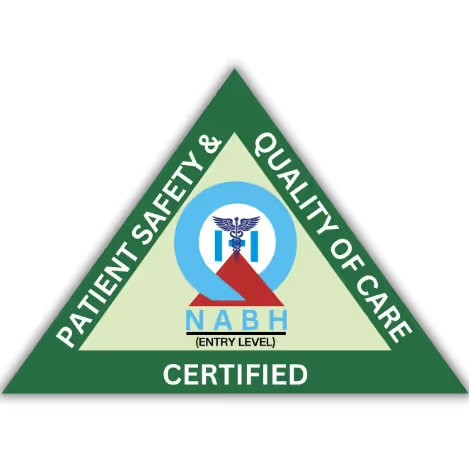By Chirag Global Hospitals

Haemorrhoids, commonly referred to as piles, are swollen veins in the lower rectum or anus. Women are more prone to develop hemorrhoids during pregnancy and the postpartum period due to increased pelvic pressure, hormonal changes, and bowel habit changes. Understanding their causes, symptoms, complications, management options, and preventive strategies is crucial for maternal comfort and well-being.
Causes of Hemorrhoids During Pregnancy
- Increased Pressure: The expanding uterus places extra pressure on the pelvic veins, leading to swelling and vein enlargement.
- Hormonal Changes: Progesterone relaxes the walls of blood vessels and slows bowel movements, increasing constipation risk.
- Constipation & Straining: Hard stools and the need to strain elevate pressure on rectal veins.
- Genetic Factors: A family history of hemorrhoids can increase susceptibility.
- Sedentary Lifestyle: Reduced movement limits circulation, making hemorrhoids more likely.
Symptoms
- Anal pain or discomfort, especially when sitting
- Itching, irritation, or a burning sensation near the anus
- Swelling or palpable lumps around the anus
- Bright red bleeding after bowel movements
- Protruding veins (prolapse) that may need to be pushed back in
Complications of Hemorrhoids in Pregnancy
| Complication | Description |
|---|---|
| Anemia | Chronic blood loss from hemorrhoids can lead to iron-deficiency anaemia. |
| Significant Bleeding | May affect maternal health and, in severe cases, impact placental well-being. |
| Infection | Untreated hemorrhoids can become infected, leading to pain, swelling, or abscess. |
| Abscess Formation | Development of pus-filled pockets that may require surgical drainage. |
| Thrombosed Piles | Blood clots in hemorrhoidal tissue cause severe pain and inflammation. |
| Fistula | An abnormal communication can form if infection spreads, sometimes requiring surgery. |
| Persistent Prolapse | Enlarged hemorrhoids can persistently protrude, complicating hygiene and causing discomfort. |
| Strangulation | The blood supply to a prolapsed hemorrhoid may be cut off, a rare but urgent complication. |
| Skin Tags | Residual skin remains may affect hygiene or cause local irritation. |
Diagnosis
Diagnosis is typically clinical, based on your symptoms and a gentle physical exam. Additional procedures (like anoscopy) are rare and used only for atypical or severe presentations.
Treatment & Management
Home and Lifestyle Measures
- Fiber-rich Diet: Fruits, vegetables, and whole grains help keep stools soft.
- Adequate Hydration: Drinking enough water prevents constipation.
- Regular Exercise: Gentle activity increases bowel motility and improves vein health.
- Good Toilet Habits: Avoid straining and do not delay when you feel the urge to pass stool.
- Warm Sitz Baths: Soaking the affected area in warm water relieves discomfort.
- Gentle Hygiene: Use unscented wipes and avoid harsh toilet paper.
Medical Treatments
- Topical Creams & Suppositories: Can ease irritation and swelling (use only under medical supervision in pregnancy).
- Mild Laxatives or Fibre Supplements: Occasionally recommended if dietary changes are not enough.
- Minimally Invasive Procedures: Rarely needed during pregnancy; surgical intervention is reserved for severe, unresponsive cases and usually postponed until after delivery.
Prevention Tips
- Eat a high-fiber diet and drink plenty of fluids.
- Exercise regularly, tailored to pregnancy (walking, swimming, prenatal yoga).
- Perform Kegel exercises to strengthen pelvic muscles and promote vein circulation.
- Do not sit for long periods; avoid prolonged toilet sitting.
- Respond promptly to the urge to have a bowel movement.
Lifestyle and Quality of Life
- Address emotional well-being; talk to your healthcare provider about concerns.
- Use support groups or counselling if hemorrhoids are causing distress or embarrassment.
- Practice proper perineal hygiene and comfort measures for symptom relief.
Safe Exercise and Postpartum Care
- Gentle walking, swimming, and prenatal yoga benefit circulation and bowel health.
- Kegel exercises help maintain pelvic tone.
- Hemorrhoids frequently resolve within weeks after childbirth, especially with good self-care.
- Continue fiber, hydration, and exercise post-delivery for ongoing prevention.
Myths vs Facts
- Myth: All hemorrhoids require surgery.
Fact: Most resolve with conservative measures. - Myth: Hemorrhoids are always dangerous during pregnancy.
Fact: They are common and usually manageable; complications are rare. - Myth: Only people with poor hygiene get hemorrhoids.
Fact: Multiple factors, including pregnancy-related changes, play a role.
Costs & Insurance
Most medical treatments, including necessary surgery for complicated hemorrhoids, are typically covered by health insurance policies, especially when medically justified.
When to Seek Immediate Medical Attention
- Severe, persistent, or worsening pain
- Heavy bleeding or black, tarry stools
- Signs of infection (fever, pus, increasing redness)
- Sudden intense swelling or inability to reduce a prolapsed hemorrhoid
- Symptoms of anemia (fatigue, shortness of breath, paleness)
Frequently Asked Questions (FAQs)
Q1: Are hemorrhoids dangerous during pregnancy?
Most hemorrhoids in pregnancy are harmless, although they can be uncomfortable. Complications like severe bleeding or infection are extremely rare but should be managed by a doctor.
Q2: Will my hemorrhoids go away after childbirth?
In many cases, hemorrhoids that developed during pregnancy improve or completely resolve within several weeks postpartum, especially with good self-care.
Q3: What is the fastest way to relieve hemorrhoid pain during pregnancy?
Gentle, warm sitz baths and unscented wipes for hygiene often provide rapid relief. Topical creams prescribed by a doctor may also help.
Q4: Can hemorrhoids during pregnancy be prevented?
While not all cases can be prevented, high-fibre diets, adequate fluid intake, regular gentle exercise, and good toilet habits sharply reduce risk.
Conclusion
Hemorrhoids are a frequent and often uncomfortable part of pregnancy, but they can be managed and prevented with simple lifestyle modifications, good hygiene, and prompt medical care for complications. Always discuss troubling or worsening symptoms with your healthcare provider to ensure the best outcomes for you and your baby.







